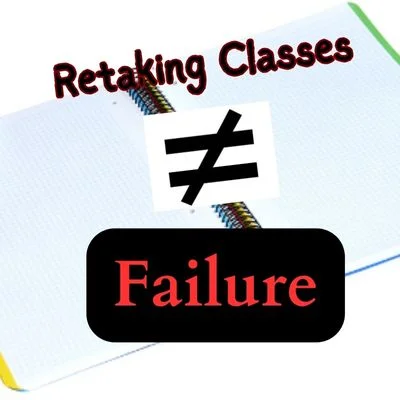Does Retaking Classes Look Bad? Or Show in Transcripts

Retaking a class is a typical decision, whether it’s due to academic difficulties, a desire for a deeper understanding of the topic, or even a change in major or job.
Retaking classes, though, raises the question of whether it would negatively impact your grade point average and whether it would appear on your transcripts permanently.
In this debate, we will analyze the subtleties of the practice of repeating classes, shining light on both its potential consequences and the factors that influence students’ decisions to take this course of action.
Reasons for Retaking a Class: Why Do Students Retake Classes?

1. Academic Struggles and Reinforcement
Students often retake classes due to academic challenges.
These difficulties may arise from various factors, such as complex subject matter, teaching styles, or personal circumstances.
Retaking a class offers the chance to clarify and reinforce understanding, improve grades, build confidence, and meet prerequisite requirements.
It serves as a valuable opportunity to overcome initial struggles and achieve a more solid grasp of the material.
2. GPA Improvement and Academic Excellence
Students retake classes to enhance their grade point average (GPA) and achieve academic excellence.
By aiming for higher grades, they can demonstrate improved proficiency in the subject and bolster their overall academic record.
Mostly, this pursuit of excellence can open doors to opportunities such as scholarships, graduate programs, or competitive career paths that require strong academic standing.
3. Career and Future Opportunities
Retaking a course is frequently driven by the desire to protect one’s future professional prospects. A minimal grade in a certain prerequisite course may be necessary for admission to certain graduate programs or professions.
Students can make sure they have the academic prerequisites for the job route they want by retaking these classes.
4. Personal Growth and Learning
Beyond grades and career goals, some students retake classes driven by a genuine thirst for knowledge and personal growth.
They view education as a lifelong journey and believe that revisiting a subject can lead to a deeper understanding and intellectual enrichment.
These students value the opportunity to explore concepts in greater depth, engage in meaningful discourse, and cultivate a broader perspective on the world through continued learning.
The Pros and Cons of Retaking a Class

Advantages of Retaking Classes
Enhanced Understanding of the Material
Retaking a class provides an opportunity to enhance one’s understanding of the material.
Concepts that may have been initially challenging become clearer upon revisitation.
Mostly, this deeper comprehension is valuable for building a strong foundation in the subject.
GPA Boost and Academic Performance
One of the most immediate advantages is the potential for a GPA boost. By retaking a class and improving their grades, students can positively impact their overall academic record.
A higher GPA can open doors to scholarships, honors programs, or graduate school admissions.
Increased Confidence
Retaking a class often leads to increased confidence in one’s academic abilities.
As students become more familiar with the material and demonstrate improved performance, they gain a sense of mastery and self-assurance.
Skill Refinement
Some classes involve the development of practical skills. Retaking such classes allows students to refine and strengthen these skills.
For example, in subjects like mathematics or language courses, practice and repetition can lead to enhanced proficiency.
Disadvantages of Retaking Classes
Time and Financial Investment
Retaking a class requires a significant investment of time and money. It extends the duration of academic studies and often involves additional tuition costs, textbook expenses, and other related fees.
Perceived Negative Impact
Some students worry that retaking a class may be perceived negatively by peers or employers. They may fear that it signals academic struggles or a lack of competence, potentially affecting their self-esteem.
Potential for Burnout
The process of retaking a class can be mentally and emotionally taxing.
Students may experience burnout, especially if they are concurrently managing a heavy course load or other academic commitments. This can impact overall well-being and motivation.
Breaking the Stigma of Retaken Classes
Dispelling the Myths: Why Retaking Classes Does not Equal Failure

Retaking a class is not synonymous with failure. It’s a testament to perseverance and determination.
When people retake a class, they showcase their commitment to mastering challenging subjects and overcoming academic hurdles.
It is essential to dispel the myth that retaking implies inadequacy.
Success in education takes many forms, and retaking a class is just one path toward achieving academic excellence.
Moreover, it demonstrates the courage to confront challenges head-on and the wisdom to prioritize understanding over grades.
It is a valuable lesson in resilience and the pursuit of knowledge, proving that failure is not the end but a stepping stone to success.
Strategies for Success
Retaking a class provides an opportunity for academic growth and improvement. To make the most of this experience, students can employ several effective strategies.
First, tailor study approaches to individual learning styles, such as active recall, summarization, or concept mapping. Experiment with various techniques to determine what works best.
Again, don’t hesitate to seek help from professors, tutors, or academic support services. Utilize textbooks, online resources, and supplementary materials to enhance understanding.
Create a balanced study schedule that allows for adequate review and practice while maintaining a healthy work-life balance. Consistency in study habits is key.
Set clear, achievable goals for the class, whether it’s mastering specific concepts or earning a higher grade. Break these goals into manageable steps to track progress.
Retaking a class is an opportunity for growth, and these strategies can empower students to maximize their learning potential and achieve their academic objectives.
Instances when Retaking is not the Best Option
Fundamental Lack of Interest
Suppose a student is retaking a class solely to improve their GPA or meet a requirement, but they need more interest in the subject.
In that case, it may be more productive to explore other courses that align better with their passions and career goals.
In such cases, investing time and effort in classes that genuinely inspire them can lead to better outcomes.
Limited Resource Availability
Retaking a class may not be feasible due to resource constraints, such as financial limitations or time constraints.
In these cases, students may need to prioritize their existing coursework or other responsibilities.
Sufficient Understanding
If a student already possesses a solid understanding of the material and received a reasonable grade, retaking the class may be optional.
It is critical to assess whether additional effort would significantly improve their knowledge or career prospects.
Transcript Implications
In institutions where retakes result in both the old and new grades appearing on transcripts, students should consider whether the potential benefits outweigh the long-term impact on their academic record.
Having two instances of the same course with different grades may raise questions.
Alternatives to Retaking Classes
Tutoring and Academic Support

Instead of retaking a class, students can seek academic support through tutoring services or study groups.
Tutoring provides one-on-one assistance and tailored guidance, helping students clarify doubts and grasp challenging concepts.
Exploring Different Learning Methods
Sometimes, a change in learning methods can make a significant difference.
Students can explore different resources, such as online courses, textbooks, or educational videos, to enhance their understanding of the subject matter.
Evaluating Long-Term Goals
Consider the long-term academic and career goals before retaking a class.
If the subject matter is not directly related to those goals or if alternative courses can fulfill requirements, it may be more advantageous to focus on different areas of study.
Real-Life Success Stories of Retaken Classes
Case one
Sarah initially struggled with her computer programming course but decided to retake it. Armed with a stronger understanding, she secured a prestigious software developer position at a renowned tech company, showcasing how retaking classes can lead to significant career advancements.
Case two
John’s retaking a challenging mathematics class led to an improved GPA, earning him a scholarship for graduate school highlighting how academic persistence can result in impressive educational achievements.
Case three
Emma’s decision to retake a psychology course not only boosted her grades but ignited a passion for the subject.
She went on to earn a Ph.D. in psychology, illustrating how retaking classes can spark personal transformation and lifelong learning.
Expert Advice and Insights on Retaking Classes
Seeking expert advice and insights on retaking classes can provide valuable perspectives. Academic advisors, professors, and tutors can offer guidance tailored to individual circumstances.
They can help students assess the necessity of retaking a class, explore alternative learning strategies, and align academic choices with long-term goals.
Expert input ensures informed decisions and maximizes the benefits of educational experiences.
Perspectives from Educators and Career Counselors

Educators and career counselors recognize that retaking classes can contribute significantly to personal growth.
They emphasize the importance of persistence in achieving academic goals, highlighting how challenges can serve as opportunities for development.
To make retaking a positive experience, they suggest strategies such as seeking academic support, setting clear goals, and maintaining a growth mindset.
Their insights empower students to approach retaking classes as a constructive step towards achieving academic excellence and realizing their career aspirations.
Conclusion
Retaking classes should not be viewed as a negative endeavor. Instead, it reflects a commitment to academic improvement, growth, and mastery of challenging subjects.
While it may appear on transcripts in some cases, it also showcases determination and resilience.
The perception of retaking classes largely depends on the context and the individual’s long-term goals.
Ultimately, the value lies in the knowledge gained, skills honed, and the journey of continuous learning that it represents.

Josh Jasen or JJ as we fondly call him, is a senior academic editor at Grade Bees in charge of the writing department. When not managing complex essays and academic writing tasks, Josh is busy advising students on how to pass assignments. In his spare time, he loves playing football or walking with his dog around the park.




